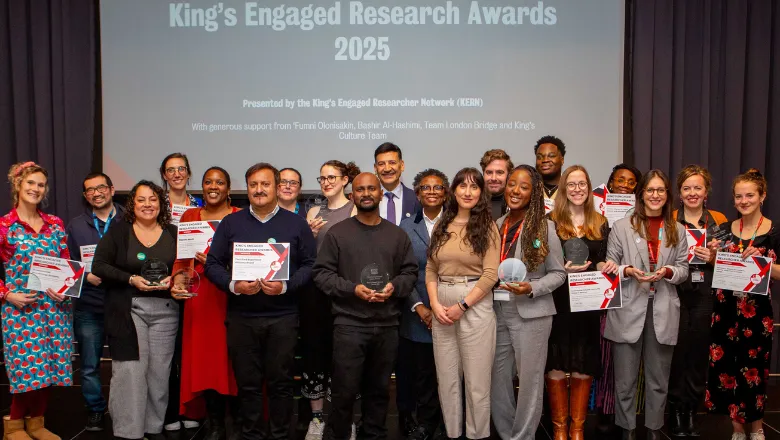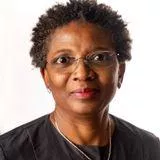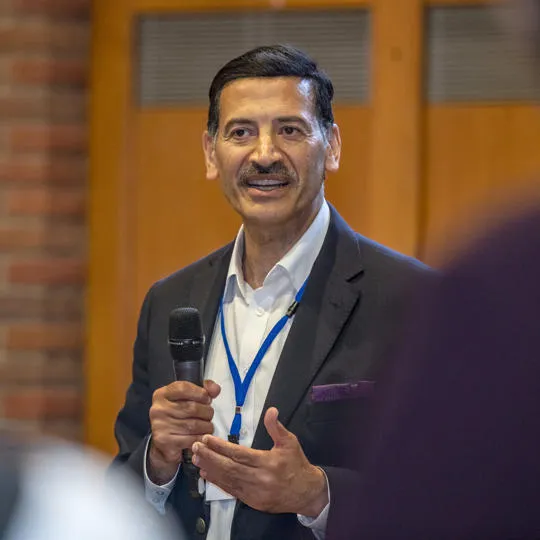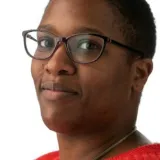When we do this we do this because of the bigger story of King’s. The bigger picture is that we want to make it count. We want to make a difference in the world around us.
Professor 'Funmi Olonisakin, Vice President (International, Engagement & Service)
20 January 2025
Winners announced for the 2025 King's Engaged Research Awards
The King’s Engaged Research Awards ceremony brought together staff, students and community partners to celebrate public and community engagement with research at King’s.

On 16 January 2025, over 130 staff, students, and community partners gathered at the Great Hall for the King’s Engaged Research Awards to celebrate best practice in public and community engagement with research at King’s.
The 13 winners, including teams of King’s staff and community partners, received awards in recognition of their outstanding achievements and contributions to impactful research. Each winner was presented with a certificate, trophy and £200. They were selected from a total of 100 nominations received by the KERN Working Group.
Created by King’s Engaged Researcher Network, the awards and ceremony contribute to efforts across the university to inspire new collaborations for impact at King’s in line with King’s Strategy 2026 and the five King’s Impact Priorities. The King’s Engaged Researcher Awards align with the key principles of One King’s Impact and are reflected throughout the award categories, by championing and celebrating impactful, holistic and multidisciplinary initiatives that drive collaborative and innovative solutions in service to society.
The ceremony was hosted by Professor 'Funmi Olonisakin, Vice President (International, Engagement & Service) and Professor Sir Bashir M. Al-Hashimi, Vice President (Research & Innovation).
What’s really at the heart of it is very much what we do needs to make an impact on others. And public and community engagement with research is a very good example of that.
Professor Sir Bashir M. Al-Hashimi, Vice President (Research & Innovation)
Presented by King’s community champions for public and community engagement with research and previous award winners, the awards covered six overarching categories showcasing excellence in engagement approaches with diverse audiences. These included subcategories linked to local, national and global work.
The categories were:
- Communicating Research - presented by Beatrice Pembroke, Executive Director of King’s Culture and 2024 winner Samatha Terry (FoLSM)
- Collaboration - presented by Amanda White, Team London Bridge
- Engaged Practice/Participatory Research - presented by Bella Spencer, British Science Association and 2024 winner Gefion Thuermer (NMES)
- Transforming Research Culture or Public Life - presented by Tim Newton, Dean of Research Culture and 2024 winner Marion Summerfield
- Integrated Education, Research and Service – presented by Abigail Oyedele, Citizens UK and Abi Robertson (One King’s Impact)
- Outstanding Individual Award - presented by Sophie Langdon, KERN Co-ordinator and 2024 winner Phoebe Reynolds (IoPPN)
The 2025 King's Engaged Research Award Winners

COMMUNICATING RESEARCH
Local: Developing Brain Workshops
Faculty of Life Sciences and Medicine
Tomoki Arichi (King's College London), Leila Hadiyat, Claudia Gracia and Fatemeh Mozaffari (Coin Street Neighbourhood Centre)
A series of 4 workshops about early brain development and differences in children with neurodevelopmental conditions were co-developed by researchers, clinicians and the PE team in BMEIS School, and Coin Street Centre. This was a response to local families’ desire to learn more about why some children develop differently and to understand the research. Attendees included parents, family support workers and local health visitors, with a variety of presentations from both researchers and NHS care services, followed by enthusiastic interactive discussions. Overwhelmingly positive feedback has helped to build new bridges with the local community for further workshops and interactive working.
National: ASPEN-Study (Attempted Suicide in the PEriNatal period)
Faculty of Life Sciences and Medicine
Kaat De Backer, Abigail Easter and The Maternal Mental Health AllianceKaat De Backer, Abigail Easter and The Maternal Mental Health Alliance
The ASPEN-study (Attempted Suicide in the PEriNatal study) is a qualitative study explore women’s experiences of perinatal suicide attempts, the circumstances that surrounded this event and the support that was available to them. Additionally, we explored these events with nominated ‘significant others’ to understand the wider context of perinatal suicide attempts. With our partners and expert by experience members, we organised a national dissemination event and made it to prime-time radio, to raise awareness and break the stigma surrounding perinatal suicide attempts.
Global: Creative Women in Lagos: A network and documentary film
Faculty of Arts and Humanities
Lauren England, Eka Ikpe and Roberta Comunian
This collaborative project facilitated knowledge exchange amongst female creative entrepreneurs in Lagos, Nigeria, and raised greater awareness of their accomplishments and experiences through a documentary film. A peer-led network (17 entrepreneurs) was established at a workshop in Lagos, now providing ongoing support for female creative entrepreneurs in the city. The documentary showcases the partners as successful entrepreneurs while additional short videos centre the wider network addressing key issues raised: education, finance, business support, and networks. The project aims to inform policy and support women engaged in creative work in Lagos. Efforts to shape future policymaking in Nigeria are ongoing.
COLLABORATION
Local: Co-designing inclusive community energy in Newham
King's Business School
Anna Rebmann
Dr. Anna Rebmann's project pioneers an inclusive approach to community energy, embedding diverse local voices in Newham's green transition. Through long-term partnerships with Newham Council and Repowering London, Anna used co-design workshops to engage underrepresented groups in shaping local energy initiatives. This collaborative approach led to the creation of Newham Community Energy, accelerated solar installations, and influenced sector-wide practices for improving diversity. By fostering meaningful two-way relationships between academia, local government, energy organizations, and diverse community groups, the project demonstrates how engaged research can drive equitable climate action and create lasting impact.
Global: Infrastructure and Peacebuilding: Examining the implications of mine clearance in Angola and Somaliland
Faculty of Social Science and Public Policy
Eka Ikpe
This research is impact-informed and has helped shape understanding on the relationship between mine clearance as a technical security-related activity on the one hand, and humanitarian and long-term sustainable development on the other hand. It used the mine clearance interventions in Somaliland and Angola to take the debate beyond the military imperative of Anti-Vehicle Mines (AVM) clearance to exemplify the advantages of the intervention on agriculture, conservation, trade, and infrastructural development. It shaped policy and funding priorities for future mine clearance in post-conflict societies.
PARTICIPATORY RESEARCH
Local: REACH Young Person Community Champions
Institute of Psychiatry, Psychology & Neuroscience
Thai-Sha Richards, Nii Okani Tettey, Karima Clement-Gbede, Adna Hashi and Jonas Kitisu
These 5 young people have been at the heart of REACH since 2016. REACH is a cohort study of adolescent mental health in South London. The YPCC work in part-time, paid roles to ensure every part of the research process includes young people’s voices.They shape research design and practice, playing a pivotal role in generating research ideas, and in interpreting and communicating results. They are a voice for young people, advocating for and sharing their extensive knowledge of youth participation in research.
National: Participatory Research Approaches to involving family careers in recovery colleges
Institute of Psychiatry, Psychology & Neuroscience
Bryher Bowness
This project involved coproducing a focus group study with three family carers, which we are co-disseminating through journal papers, conferences, briefing papers, practice recommendation posters and webinars internationally. This led to me collaborating with four carers and Oxfordshire Recovery College through a Participatory Action Research project to codesigning, cofacilitating and co-evaluating a creative course for family carers. Meanwhile, I worked with the NIHR to create recommendations for involving carers in research, and with SLaM IoPPN Research & Development department to improve governance processes for peer researchers.
Global: Photovoice as a potential intervention for loneliness among older migrants from Myanmar
Faculty of Social Science and Public Policy
Samia Christina Akhter-Khan and Rosie Mayston
Photovoice as a Potential Intervention for Loneliness Among Older Migrants from Myanmar, leverages the Photovoice method to address loneliness among older Myanmar migrants in Thailand. Participants actively took part in a six-week photography workshop that was co-facilitated by an older participant from Myanmar. Older people used photography to express how they care for others and the environment and curated an exhibition. The local and global exhibitions offered a platform for Myanmar older migrants to share their experiences and gain respect within their communities. The evaluation suggested that Photovoice may be a promising intervention for alleviating loneliness.
TRANSFORMING RESEARCH CULTURE
The Lived Experience Advisory Board
Institute of Psychiatry, Psychology & Neuroscience and Faculty of Social Science and Public Policy
Angela Sweeney (King's College London), Rhea Sookdeosingh (King's College London), Sonia Thompson, Rachel Hill, Janahan Sivanathan, Bwalya Mulenga, Cassie Lovelock, James Lane, Raza Griffiths, Rick Burgess and Zazie Lawson (LEAB members)
The Lived Experience Advisory Board (LEAB) at the ESRC Centre for Society and Mental Health (CSMH) is a diverse group of individuals with direct and/or indirect experiences of disabling barriers, neurodivergence, mental distress, mental illness, trauma, caring/supporting people in mental distress, and/or (ref)using mental health services. They challenge traditional hierarchical power structures and what it means to ‘hold or produce knowledge’ within academia and beyond. The LEAB have transformed the research culture of CSMH from one of consultation to inclusive partnership working. In doing so, they have co-produced our core ethos, strategic priorities and research, and spearheaded independent LEAB-led projects.
INTEGRATED EDUCATION, RESEARCH AND SERVICE
Developmental Neurobiology Academy
Institute of Psychiatry, Psychology & Neuroscience
Leigh Wilson
The Developmental Neurobiology Academy (DNA) is a dynamic widening participation (WP) outreach program for A-level students, hosted by leading neuroscience centres: the Centre for Developmental Neurobiology and MRC Centre for Neurodevelopmental Disorders. DNA selects 60 WP Y12 students annually for a summer school and a year-long Champions’ program, with continued engagement through an alumni network. Blending lab experiences and interactive research exploration, DNA also includes workshops on multidisciplinary thinking, science communication, skill-building, and university application and experience guidance. This program successfully broadens access to higher education through an innovative research-driven approach, fosters a sense of belonging while advancing social mobility, education, inclusivity, and engagement with cutting-edge neuroscience research.
OUTSTANDING INDIVIDUAL
Early Career Researcher: Ella Parry-Davies
Arts and Humanities
Dr Ella Parry-Davies (Lecturer in Theatre, Performance and Critical Theory) has been conducting impactful research at the intersections of migrant justice, anti-trafficking and healthcare access since 2018, innovating methods of knowledge co-creation that are grounded in creative performance. Since joining King’s in September 2022 she has worked with grassroots partner organisations including The Voice of Domestic Workers (as PI on research production and policy engagement) and Positively UK (through co-hosting an Activist-in-Residence programme), collaborating with under-represented co-researchers such as survivors of trafficking and migrant women living with HIV. Ella’s work prioritizes research co-creation from inception, to data collection, to publication and policy-focused impact activity.
Established Academic: Anand Menon
Faculty of Social Science and Public Policy
Professor Anand Menon has played a pivotal role in elevating King’s research to national and international prominence. Since founding UK in a Changing Europe (UKICE) in 2015, he has built the organization from the ground up to fulfil its mission of connecting wider audiences with leading social science research. Through his publications, media articles, and hundreds of TV and radio appearances, Anand and UKICE have become the central authoritative academic voice and source of evidence in the long and polarised political debates over Brexit and UK-EU relations, ensuring that high-quality academic insights inform and shape these critical discussions.
Professional Services: Deanne Naula
Faculty of Life Sciences and Medicine
Deanne has made an outstanding contribution to the sector. This quote from our academic PE co-lead sums up Deanne’s contributions nicely: “Deanne has made the most remarkable progress in reaching out to communities that do not traditionally engage with science, e.g. grassroots organisations in King's very diverse neighbourhoods and people attending popular events such as Lambeth Country show. At the latter I have witnessed first-hand how passers-by engaged with our work. Deanne is thus making very important contributions to societal acceptance of science and removing the "ivory tower" image of universities in their own local communities.”
Click here for the full programme and read more about all the shortlisted projects.
For more information about the awards, please contact King's Engaged Researcher Network at kern@kcl.ac.uk.
Find out more
King’s Engaged Researcher Network (KERN) is an exciting collaboration, launched in late 2016. We foster a growing community of King’s staff and students interested in developing sharing and celebrating their public engagement practices.
Sign up to the newsletter and find out more about how KERN helps to contribute to our vision of public and community engagement with research at King's here.
Join the King's Impact Changemakers - a network is a powerful coalition of students, staff and partners dedicated to positive change for people, planet and society. We work to find different ways to unite our collective resources, expertise and partners to make the biggest impact.
In this story
Related departments
- King's Engaged Research Awards
- King’s Engaged Research Network (KERN)
- ESRC Centre for Society and Mental Health
- Faculty of Arts & Humanities
- Faculty of Life Sciences & Medicine
- Faculty of Social Science & Public Policy
- Institute of Psychiatry, Psychology & Neuroscience
- King’s Business School
- School of Biomedical Engineering & Imaging Sciences





